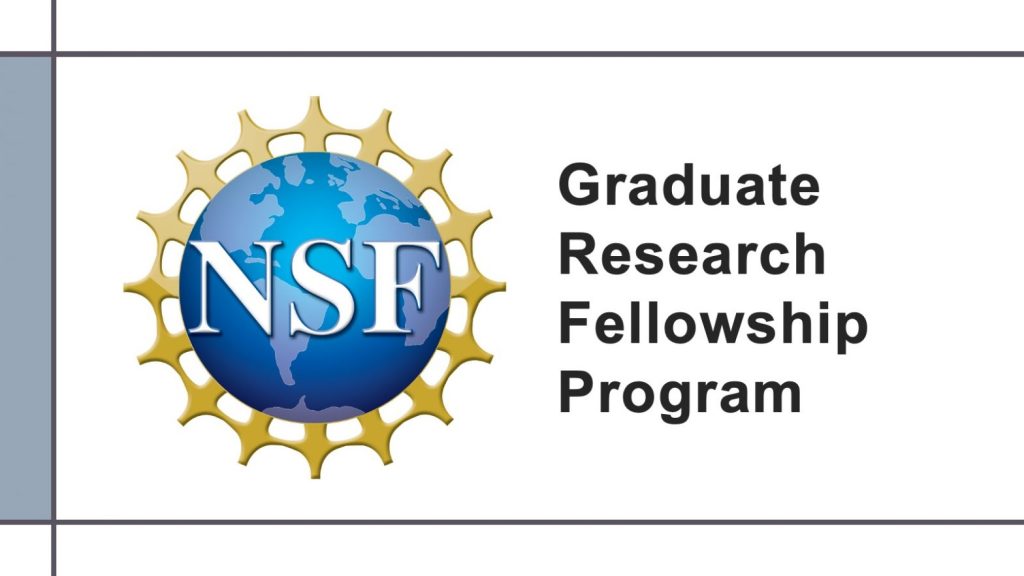Student Guide to Prepare for a Successful NSF Graduate Research Fellowship Application

The National Science Foundation (NSF) awards ~ 2,000 fellowships annually to new graduate students in a STEM fields including biological science, technology, engineering, mathematics, physical science, earth science and a variety of social sciences (ie, psychology, economics, anthropology). The three-year Fellowship provides a stipend (salary) of $37,000/year and educational allowance to cover tuition. Application for the NSF GRF is independent of applications for graduate school. Undergraduates apply during the early fall of their senior year, awards are announced in April, and then students can use their Fellowship at their chosen graduate institution.
The National Science Foundation has a very robust website with information on eligibility, preparing to apply, resources, and FAQs.
Additional information on the application process can be found at the MU Global & National Fellowships website and the informative Graduate Research Fellowship site. You may also contact the Office of Undergraduate Research directly at ugr@missouri.edu, or call 573-882-5979.
To be successful in applying for the NSF-GRF, undergraduates will need to purposefully engage in undergraduate research and other activities for multiple years while at MU. These activities and accomplishments will also prepare students for competitive PhD programs.
- Most students begin by assisting with a research project during their freshman or sophomore year (~10 hrs/week).
- By the time a student is a junior, they should have their own research project conducted under the guidance of the faculty mentor (~12-15 hrs/week).
- At least two summers should be spent conducting research full-time. This may be done at MU and/or students may apply for summer programs at other research institutions to gain new skills, knowledge, and another faculty mentor. The Office of Undergraduate Research can help students identify these opportunities.
- Students should be presenting their research at MU 2-4 times per year. Presentation opportunities include the Spring and Summer Forums, disciplinary research events (such as the IPG Symposium), and at department/college events.
- Juniors and seniors should be presenting their research at regional and national research conferences identified by their mentor.
- Students should be contributing to peer-reviewed publications authored by their research mentor.
- Students should be applying for additional honors and awards at MU and nationally. Examples include the Award for Academic Distinction (MU), the Goldwater Scholarship, and the American Society for Plant Biologists SURF program.
Seniors may be eligible to take graduate level courses in their discipline.
Students should take advantage of the resources at the Learning Center and Writing Center.
Juniors and seniors may consider serving as undergraduate TAs, tutors, or Writing Center staff.
- This will include a letter from your research mentor at MU and faculty instructors for courses in your major.
- This would also include a faculty mentor at another institution if you have done research elsewhere over the summer.
- Developing relationships with faculty to write such letters is a multi-year process.
- Serving as an undergraduate research ambassador
- Science Outreach activities
- Working as a STEM tutor or TA
- Presenting your research to elected officials or the lay public in multiple venues
- Participating with on-going Broader Impacts activities with your research team
- Students should identify the area of graduate study (ie, genetics)
- Students will need to prepare a project proposal on a specific topic (ie, the role of auxin in controlling growth in maize leaves)
- A number of potential graduate schools should be identified. The NSF GRF application is due in October and graduate applications are due in November, December, January.
- Potential career paths should be explored to be able to articulate what options the student has considered after graduate study.
Gaining meaningful experiences, exploring summer and graduate school options, identifying areas for graduate study and career tracks, and participating in Broader Impact activities is a multi-year process. Students will find guidance from faculty mentors, and staff in Global and National Fellowships, Undergraduate Research, the Honors College, the Writing Center, and the Career Center. Students should be proactive in discussing their goals as soon as they begin to consider graduate study.